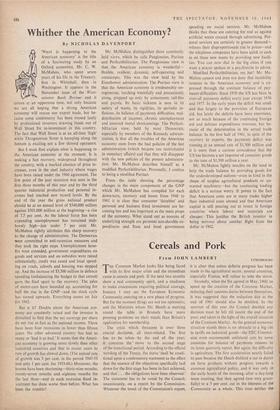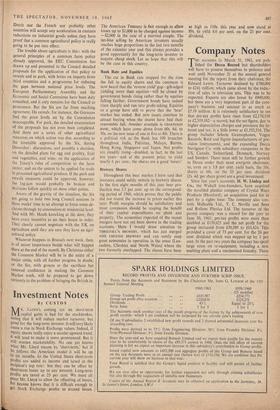Cereals and Pork
From JOHN LAMBERT LUXEMBOURG
THE Common Market looks like being faced with its first major crisis and the immediate cause is cereals and pork. If the next two months show a real community spirit, and a readiness to make concessions requiring political courage, January 1 may see the European Economic Community entering on a new phase of progress. But for the moment things are not too optimistic; and the Ministers whom Mr. Heath is meeting round the table in Brussels have more pressing problems on their minds than Britain's application for membership.
The crisis which threatens is over three crucial decisions, all inter-related. The first has to be taken -by the end of the year; it concerns the' move to the second stage of the transitional period. According to the official wording of the Treaty, the move 'shall be condi- tional upon a confirmatory statement to the effect that the essence of the objectives specifically laid down for the first stage has been in fact achieved, and that ... the obligations have been observed.' The statement has to be voted by the Council, unanimously, on a report by the Commission. Whatever the trend of the Commission's report, it is clear that unless definite progress has' been made in the agricultural sector, several countries, especially France, will refuse to vote the move.
Secondly, when the Six agreed in May, 1960, to speed up the creation of the Common. Market, reducing their customs duties between themselves, it was suggested that the reduction due at the end of 1961 should also be doubled. In the summer of this year the Council decided any decision must be left till nearer the end of the year, and taken in the light of the overall situation of the Common Market. As the general economic situation stands there is no obstacle to a big aft in tariffs on industrial goods—the EEC Commis- sion even recommends unilateral cuts by some countries for balance of payments reasons in its latest quarterly report. But again, the difficulty is agriculture. The first acceleration nearly failed to pass because the Dutch disliked a cut in duties on farm products without progress towards a common agricultural policy, and it was only in the early hours of the morning, after a day-long tense meeting, that they agreed (not very grace- fully) to a 5 per cent, cut in the interests of the Community as a whole. This time neither the
Dutch nor the French nor probably other countries will accept any acceleration in customs reductions on industrial goods unless they have proof that a common agricultural policy is really going to be put into effect.
The trouble about agriculture is this: with the general principles of a common farm policy already approved, the EEC Commission has drawn up and presented to the Council detailed proposals for the application of that, policy to cereals and to pork, with levies on imports from third countries and a programme for reducing the gaps between national price levels. The European Parliamentary Assembly and the Economic and Social Committee have been duly consulted, and it only remains for the Council to pronounce. But the Six are far from reaching agreement. On cereals, for instance, the Germans find the price levels set by the Commission unacceptable. For pork, the detailed examination of the proposals has not even been completed. And there are a series of other agricultural measures on which action was due, according to the timetable approved by the Six, during December : discussions, and possibly a decision, on the detailed plans for egg and poultry, fruit and vegetables, and wine; on the application of the Treaty's rules of competition to the farm sector; and on the system to be applied for trade in processed agricultural produce. If the pork and cereals measures could be approved, however, the log-jam would probably be broken and decisions follow quickly on these other points.
Aware of the gravity of the situation, the Six are going to hold two long Council sessions in three weeks' time in an attempt to force some de- cisions through by concessions at ministerial level. And with Mr. Heath knocking at the door, they have every incentive to set their house in order. They clearly cannot negotiate with the UK on agriculture until they are sure they have an agri- cultural policy.
Whatever happens in Brussels next week, then, is of minor importance beside what will happen there at the end of the month. By Christmas either the Common Market will be in the midst of a major crisis, with all further progress in doubt; or the Six, with groans at the sacrifices but renewed confidence in making the Common Market work, will be prepared to get down seriously to the problem of bringing the British in.











































 Previous page
Previous page